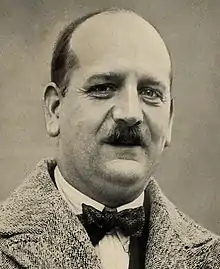Pierre-Étienne Flandin
Pierre-Étienne Flandin (French pronunciation: [pjɛʁ etjɛn flɑ̃dɛ̃]; 12 April 1889 – 13 June 1958) was a French conservative politician of the Third Republic, leader of the Democratic Republican Alliance (ARD), and Prime Minister of France from 8 November 1934 to 31 May 1935.[1][2]
Pierre-Étienne Flandin | |
|---|---|
 | |
| 74th Prime Minister of France | |
| In office 8 November 1934 – 1 June 1935 | |
| Preceded by | Gaston Doumergue |
| Succeeded by | Fernand Bouisson |
| 80th Prime Minister of France (as President of the Council) Head of State and nominal Head of Government : Philippe Pétain | |
| In office 13 December 1940 – 9 February 1941 | |
| Preceded by | Pierre Laval |
| Succeeded by | François Darlan |
| Personal details | |
| Born | 12 April 1889 Paris, France |
| Died | 13 June 1958 (aged 69) Saint-Jean-Cap-Ferrat, France |
| Political party | Democratic Republican Alliance |
A military pilot during World War I,[3] Flandin held a number of cabinet posts during the interwar period. He was Minister of Commerce, under the premiership of Frédéric François-Marsal, for just five days in 1924. He was Minister of Commerce and Industry in the premierships of André Tardieu in 1931 and 1932. Between those posts, he served under Pierre Laval as Finance Minister. He was Minister of Public Works in the cabinet of Gaston Doumergue in 1934. He became Prime Minister in November 1934, but his premiership lasted only until June 1935. However, a number of important pacts were negotiated during his term: the Franco–Italian Agreement, the Stresa Front and the Franco-Soviet Pact.[1] Flandin was, at 45, the youngest prime minister in French history.[3]
Flandin was the French Foreign Minister when Adolf Hitler reoccupied the Rhineland in 1936.[4] Supporting appeasement during the Munich crisis hurt his career.[3] In December 1940, Vichy Chief of State Philippe Pétain appointed Flandin Foreign Minister and Prime Minister on 13 December 1940, replacing Pierre Laval. He occupied that position for only two months.[5]
He was ousted by François Darlan in January 1941.[6]
A street in Avallon was named in his honour.[7] In May 2017, it was renamed in honour of the murdered British MP, Jo Cox.[8]
Flandin's ministry, 8 November 1934 – 1 June 1935
- Pierre Étienne Flandin – President of the Council
- Georges Pernot – Vice President of the Council and Minister of Justice
- Pierre Laval – Minister of Foreign Affairs
- Louis Maurin – Minister of War
- Marcel Régnier – Minister of the Interior
- Louis Germain-Martin – Minister of Finance
- Paul Jacquier – Minister of Labour
- François Piétri – Minister of Military Marine
- William Bertrand – Minister of Merchant Marine
- Victor Denain – Minister of Air
- André Mallarmé – Minister of National Education
- Georges Rivollet – Minister of Pensions
- Émile Casset – Minister of Agriculture
- Louis Rollin – Minister of Colonies
- Henri Roy – Minister of Public Works
- Henri Queuille – Minister of Public Health and Physical Education
- Georges Mandel – Minister of Posts, Telegraphs, and Telephones
- Paul Marchandeau – Minister of Commerce and Industry
- Édouard Herriot – Minister of State
- Louis Marin – Minister of State
References
- "M. Pierre Flandin – A Former Premier of France". The Times. 14 June 1958.
- "Alliance républicaine démocratique (ARD)". Quid.fr. 2008. Archived from the original on 21 November 2007. Retrieved 13 May 2009.
- Gunther, John (1940). Inside Europe. New York: Harper & Brothers. p. 196.
- "Berlin Talks on Reconciliation – Mr Flandin's Statement". The Times. 7 March 1936.
- His reputation has suffered considerably partially for the very negative comments in the 1944 book by Pertinax, The Gravediggers of France (Chapter 5) in which the author blames him for strengthening appeasement, which ultimately led to Hitler's invasion. "Histoire des Chefs de Gouvernement". République Française – Portail du Gouvernement. 2009. Archived from the original on 13 April 2005. Retrieved 15 May 2009.
- Dank, Milton (1974). The French against the French. London: Cassell. pp. 365 p. 338. ISBN 0-304-30037-3.
- 47.4889607°N 3.8977763°E
- Gacon, Armelle. "Inauguration - L'ex-rue Pierre-Etienne Flandin porte désormais le nom de Jo Cox, à la Morlande". L'Yonne republicaine. Retrieved 27 November 2017.
External links
| Political offices | ||
|---|---|---|
| Preceded by Louis Loucheur |
Minister of Commerce, Industry, Posts, and Telegraphs 1924 |
Succeeded by Eugène Raynaldy |
| Preceded by Georges Bonnefous |
Minister of Commerce and Industry 1929–1930 |
Succeeded by Georges Bonnet |
| Preceded by Georges Bonnet |
Minister of Commerce and Industry 1930 |
Succeeded by Louis Loucheur |
| Preceded by Louis Germain-Martin |
Minister of Finance 1931–1932 |
Succeeded by Henry Chéron |
| Preceded by Joseph Paganon |
Minister of Public Works 1934 |
Succeeded by Henry Roy |
| Preceded by Gaston Doumergue |
President of the Council 1934–1935 |
Succeeded by Fernand Bouisson |
| Preceded by Philippe Pétain |
Minister without Portfolio 1935–1936 |
Succeeded by – |
| Preceded by Pierre Laval |
Minister of Foreign Affairs 1936 |
Succeeded by Yvon Delbos |
| Preceded by Pierre Laval |
Minister of Foreign Affairs 1940–1941 |
Succeeded by François Darlan |